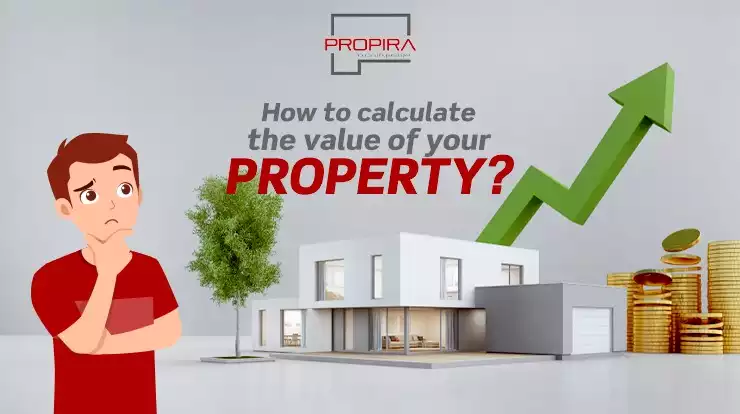
Calculate the Right Market Value of the Property - Propira
Calculate the Right Market Value of the Property - Propira

How to calculate the right market value of the property?
Many times people face a situation when they plan to sell or buy a property. The very first thought that usually comes to mind is about how to figure out the market value of such property before the time of sale or purchase.
But they didn’t understand how to calculate the fair/right market value of the property. It is very much important to ensure the right property valuation to avoid any unwanted issue.
It’s been observed that, primarily sellers have a major concern about property valuation that the value of the property is not based on what they initially paid.(the money they spent on its renovation.)
If you have been there then this article is for you.In this detailed guide by Propira, we have covered comprehensively the topic of “Property Valuation”.
It is useful to all those people who have been dealing in property or planning to do so in the future.
Let's Jump into the guide right away.
Also Read - DIY Hacks to Sell your Home Successfully
What is the Market Value of Land/Property?
Also known as fair market price. It is to be noted that, there is no universally accepted definition of ascertaining market value of the property.
But, It is generally known as the amount that a buyer is willing to pay and the seller is willing to accept under normal conditions. Normal conditions here means no force, occurrence of undesirable incidents like death, critical illness, etc. that forces a person at undesirable prices.
It is decided by mechanisms of demand and supply. In the real estate market a buyer should quote a slightly higher price and the seller must value the property at a price lower than offered. Of course, there are many factors that influence the market value.
That bring us to the next section
Factors That Influence Market Value of a Property
The Market value of the property is determined by several factors. Here below some of the most important ones are listed:
-
External Elements - When viewed from outside the factors that determine the market value like water facility, sewage system, architectural style, the property's attractiveness, among others.
-
Internal Elements - The market value also depends on internal factors of the property like construction quality(If any), size of property or area, and these all factors directly bear the property's market value.
-
Location - Location is always examined as the prime factor, safe and peaceful neighborhoods, connectivity, rural or urban area, etc. are the essential factors that considerably affect valuation of a property.
-
Market supply and demand - Effects on property prices are based on dynamics of demand and supply in a particular region. Market dynamics are calculated by considering the number of buyers in the following area and how quickly a property sells in your area.
Do Checkout - Real estate for investment? Five tips to make the right choice
What is a Property valuation?
A Property valuation is the process of assessing the market value of. As we have seen above it depends on factors such as location, condition, or various other factors.
But, here a particular economic value to real estate peace is decided. It typically seems to determine fair market value, which means the price at which the seller willingly sells their property and buyer will preferably purchase it.
Both parties must have a mutual agreement, and neither forces each other to buy or sell. Property valuation lies upon four fundamental pillars: Demand, Utility, Scarcity, and Transferability.
- Demand- The interest and purchasing power of the buyer.
- Utility- Usability propels the demand of a particular property. As it satisfies the desired and future needs of the owner.
- Scarcity-It is widely recognized that there is a limited supply of real estate. So the scarcity factor generally keeps the prices on the higher side.
- Transferability- The ease at which property ownership rights can be transferred significantly impacts its valuation.
How to do Property valuation?
Before doing property valuation, you have to collect some critical financial data for your doing it correctly:
Mortgage payment - It is based on whether or not the payment includes property taxes and insurance.
Down payment - The amount will vary based on the type of mortgage loan and the investment strategy being used.
Rental income - It includes an allowance for vacancy and rental cash flow left after paying the mortgage and ordinary operating expenses.
Price to income ratio - It compares the median home price to the median income in the market. As the ratio decreases, homes become more affordable to buy, which implies that the number of prospective tenants could decrease.
Gross rental yield - It is measured by dividing the total purchase price of the property (including closing costs and fees and improvements needed) by the annual gross rent. The higher the rental yield percentage, the higher the investment property could be.
Capitalization rate - It measures the rate of return on a rental property and is calculated by dividing the net operating income by the market value. Because the capitalization rate does not require the cost of financing, it's easy to make an exact comparison of the same properties in the same market area.
Cash flow- The money that remains after all expenses, including the mortgage, has been paid and usually measured monthly and annually. Negative cash flow rises when costs and debt service are higher than the rental income received.
Methods of Property valuation
Cost Approach
The cornerstone of the cost approach is to ask: What would it cost to replace this asset? This approach assumes you'd have first to purchase a piece of land of similar quality and in (nearby) or the exact location; on top of that, you have to factor in the cost of constructing a new asset.
In most cases your building is not brand new, so you have to consider and adapt for its age, present constraint, depreciation, etc.
This approach functions on the “principle of substitution”.
Investors looking at your property will not purchase it if they could find a similar property next to you that creates the same economic value.
Why would someone pay high for a new property? So the cost approach places a ceiling on the market value of a specific bit of property.
The Market Approach
The market approach compares your asset to other similar properties and ensures it is priced accordingly. No one would purchase your property if it is priced higher than the other properties around it.
On the other hand, someone would easily pick it up if everyone else around was priced for more. You would acquire at the same price in the marketplace if a similar building across the street sold last month.
Not everything is directly comparable, though—you may have to make adjustments to equalize the things, accounting for things like age, size, or functionality.
The Income Approach
Some commercial buildings raise income through lease payments. The income approach decides value by asking “what present value would reasonably support the future cash flow”.
And your future expected revenue minus estimated expenses (like property taxes, upkeep, maintenance, management fees, etc.) and discounted that amount into the current value to find the present value.
[Future Revenue(Expected) - Est. Expenses]
The discount rate you use should be proportionate to the risk occured with the expected income; you'll require a higher rate of return if values are highly uncertain.
So if the payment is highly volatile (maybe you're not sure about certain tenants, for example), you can try to account for that with a higher discount rate.
On the other side, if you're confident about making a reasonably accurate estimate of future income (the building has safe tenants with long-term agreements in place), you would not need a high discount rate.
How to get the Market value of land?
Let us look at some of the main points you must know about land valuation.
- The market value of land/ property is the lowest price at which we can sell property in an area/ locality. It is decided by the respective state government. It is the least amount for which a given property needs to be registered.
- A seller has full right to sell the property at the rate he demands. And the buyer has no right to force him to sell at the market value of property decided by the government.
- You will have to pay the property tax on the market value, or you can lay hands on a property for a price lower than its market value; even then, it can be registered at the guidance value that the government has set.
- If you buy the property for an amount higher than the market value, you have to buy it at its actual value and pay the taxes accordingly.
Conclusion
We hope this blog gives you a fair idea about how to ascertain the fair market value of a property. We learned about the different methods you can use for property valuation, like Income Approach, Cost Approach, or Market Approach among others things as well.
Propira is the top real estate consultant that deals widely across properties in Alwar, Rajasthan. It is a one of its kind portal that connects buyers and sellers of any kind of property such as
Residential Properties - Flats and Independent House in Alwar for sale and rent.
Commercial Properties - Shops, Industrial land in Alwar, etc.
Pg Accomodation
For any kind of guidance and consultation get in touch with us. By requesting a callback from our team.










Write Comment